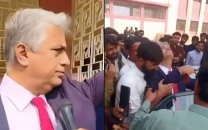ATC admits Hafiz Saeed’s plea to club all cases against him
Court to conclude all six terror financing cases simultaneously

Hafiz Saeed. PHOTO: REUTERS
The court had indicted the JuD chief and three of his associates – Hafiz Abdul Salam bin Mohammad, Mohammad Ashraf and Prof Zafar Iqbal – on terror financing charges on December 11 last year in a case filed by the Counter Terrorism Department. Saeed and Prof Zafar Iqbal were later indicted in a similar case on December 20. The cases were filed by CTD Lahore and Gujranwala chapters.
The ATC on Saturday last week had deferred announcing its verdict in the terror financing cases and decided to hear arguments on Feb 11 on the suspects’ application to hear all cases first before reserving its judgment.
The application, filed by the petitioners’ counsel, requests that collective verdicts be issued after the completion of trials in all the cases pending against them.
The petitioner states that the government was pressurised by India and the United States and therefore, filed false and baseless cases against him.
The petition also prayed the court to quash the false First Information Report (FIR) registered against the JuD chief.
According to Deputy Prosecutor General Abdul Rauf Wattoo, in total six cases against the said individuals are pending before the same court, adding that in four of these cases presentation of evidence is in progress.
The deputy prosecutor general said hearing of all four remaining cases will be concluded simultaneously at the end of the week, which is when the court will issue its verdicts. The court has already reserved its verdicts in two of the cases.
The reserved verdicts, which relate to terror financing cases, will also be announced with those in other cases at the end of the week, he added.
Banned JuD leader Hafiz Saeed arrested in Punjab
On July 3 last year, 13 top leaders of the banned outfit, including its chief Saeed and Naib Emir Abdul Rehman Makki, were booked in nearly two dozen cases of terror financing and money laundering under the Anti-Terrorism Act, 1997. Saeed was later arrested by the CTD on July 17 while he was travelling between Gujranwala and Lahore.
Saeed is nominated in 29 cases pertaining to alleged terror financing, money laundering as well as illegal land grabbing. During the trial of both cases, the court recorded the statements of 23 witnesses.
The crackdown on JuD last year followed a warning by the Paris-based Financial Action Task Force to Pakistan to deliver on its commitments to curb terror financing and money laundering.
The government had announced a ban on JuD and Falah-e-Insanyat Foundation (FIF) to partially address the concerns raised by India that Pakistan supported these and six similar organisations, including Jaish-e-Mohammad (JeM) or at least considered them low-risk entities.
The law enforcement agencies over the next few weeks had intensified their crackdown on JeM, JuD, FIF and other banned outfits, and arrested more than 100 activists. Nearly 200 seminaries besides hundreds of other facilities and assets associated with them across the country were taken over by the government.



















COMMENTS
Comments are moderated and generally will be posted if they are on-topic and not abusive.
For more information, please see our Comments FAQ